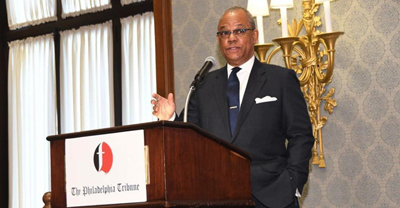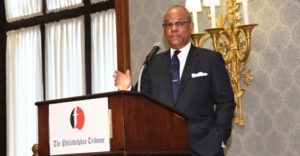

By John N. Mitchell Tribune Staff Writer, Philadelphia Tribune
Genius Child This is a song for the genius child. Sing it softly, for the song is wild. Sing it softly as ever you can – Lest the song get out of hand. Nobody loves a genius child. Can you love an eagle, Tame or wild? Can you love an eagle, Wild or tame? Can you love a monster Of frightening name? Nobody loves a genius child. Kill him — and let his soul run wild. — Langston Hughes
In a packed upstairs dining room in the Union League in Center City, the Rev. Calvin O. Butts III of the historic Abyssinian Baptist Church in New York City, delivered a powerful keynote speech on Thursday at The Philadelphia Tribune Christopher J. Perry/Carter G. Woodson Black History Awards Luncheon.
Butts held the attention of more than 400 people as he paid homage to The Tribune’s honorees — advertising giant George Beach, retired television broadcaster Vernon Odom, and local pastor the Rev. William J. Shaw, this year’s recipients of the History Maker Award — and charged those in attendance to press on to make history for future generations coming behind them.
“We have developed into a nation of strong and powerful people who have achieved much and have so much more to achieve,” Butts said. “In our efforts to achieve and grow as Americans, we have met every obstacle that has been placed in our path. And we thank God for men and women who have risen to that rarified place where they do not see color and judge people by the content of their character so that all of us might be able to make America great.
“But I am concerned about people who are content to sit back and say, ‘that’s enough, I’m done.’ I’m happy to be in Philadelphia asking the question, ‘where would this nation be without Richard Allen? Where would we be without Cecil B. Moore? Where would we be without Octavius Catto? Where would our nation be without a man who won freedoms for his people and then was shot to death for having done so. It is with that spirit that Black people must continue to move ahead to make sure that the future of young people can be pulled into the NBCs and the CBSes and the Wells Fargo’s.”
Butts’ speech alluded to Black Wall Street, the thriving Black business district in Tulsa, Oklahoma, that was burned to the ground by angry white mobs in 1921. He compared this to the gentrification of formerly downtrodden Black neighborhoods in cities like Philadelphia, Chicago and New York, where Black are being priced out of their former neighborhoods.
He deftly wove his keynote around the Langston Hughes poem “Genius Child,” which describes a the death of a prodigy. Butts closed his speech by asking the luncheon attendees if they could afford to let the next generation die.
Butts’ words earned a standing ovation.
Emmy award-winning NBC10 anchor Jacqueline London guided the program. Attendees were welcomed by Robert W. Bogle, president and CEO of the Philadelphia Tribune.
Mayor Jim Kenney spoke briefly, as did a small group of others before the honorees were acknowledged.
Beach is regarded as Philadelphia’s “dean” of African-American advertising executives. For more than four decades, his company, Beach Creative Communications, has been the advertising agency of choice for entities such as Campbell Soup Company, The Hershey Company and the Philadelphia Convention Center.
Shaw, the pastor at White Rock Baptist Church in West Philadelphia since 1956, is a religious leader who has served at the local, state and national levels as president of the Baptist Ministers’ Conference of Philadelphia and Vicinity, president of the Pennsylvania Baptist State Convention, Inc., and president of the National Baptist Convention, USA. Inc.
However, it was Odom, who recently retired from WPVI-TV/6abc in Philadelphia, who told the most poignant story about what inspired him to work toward a career as a television broadcaster.
Odom’s great-grandfather, B.T. Harvey Sr., launched the nation’s second African American-owned newspaper, The Columbus (Georgia) Messenger. Harvey wrote stories condemning lynching, and as a result, the paper eventually was burned to the ground.
Odom, who comes from a long line of journalists — his sister, Maida, was a reporter at The Boston Globe and The Philadelphia Inquirer and now teaches at Temple University — said he was proud to be a torch bearer.
“It’s a tremendous honor to be honored by the Tribune,” he said. “Journalism has been in my family for a long time. This is an honor that in huge part honors those who helped an inspired me. I’m very proud of that.”


Be the first to comment